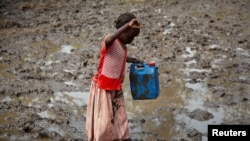WASHINGTON, D.C. —
The International Organization for Migration (IOM) may be best known for facilitating the safe flow of migrants across borders, but it is also taking a lead role in trying to stem the spread of the potentially deadly Hepatitis E virus in refugee camps in South Sudan.
Some 4,800 people in four refugee camps in Upper Nile and Unity states have contracted the liver disease, which is “mainly caused by terrible living and health conditions, especially when people share bad water that is somehow mixed with human excrement,” IOM spokesman Jumbe Omari Jumbe told VOA News in an interview Tuesday.
The IOM is trying to help improve conditions at the camps, but the real solution to the health crisis in South Sudan would be “for the two countries to come to an agreement to stop the fighting, to stop the cause of the influx of refugees, Jumbe said.
Fighting between Sudanese forces and rebels in the border states of Blue Nile and South Kordofan, both in Sudan, has sent tens of thousands of civilians fleeing into overcrowded refugee camps in the new nation of South Sudan.
The IOM has been “a lead organization in providing water, sanitation and hygiene in this area since the influx of refugees started in 2011,” Jumbe said.
“Now the situation has been aggravated because of the rainy season and the huge influx of refugees from Blue Nile. We did not expect this number of refugees” to pour southward across the border, he said, putting the number at more than 100,000.
Doctors Without Borders (MSF) has said more than 112,000 refugees are crammed into the refugee camps.
The IOM was called in by the U.N. High Commissioner for Refugees (UNHCR) to help stem the spread of Hepatitis E in the camps.
“We are actually experts in camp management and providing ‘WaSH’ – water, sanitation, hygiene – and transport,” Jumbe said.
“The UNHCR has the lead and they are the ones who tell us come in to assist in this because we have the expertise in this area,” he said.
Hepatitis E, which usually causes acute infection and resolves by itself, was first diagnosed in one of the camps last year. This month, MSF says 88 people have died of the illness in the camps, including 15 pregnant women.
Some 4,800 people in four refugee camps in Upper Nile and Unity states have contracted the liver disease, which is “mainly caused by terrible living and health conditions, especially when people share bad water that is somehow mixed with human excrement,” IOM spokesman Jumbe Omari Jumbe told VOA News in an interview Tuesday.
The IOM is trying to help improve conditions at the camps, but the real solution to the health crisis in South Sudan would be “for the two countries to come to an agreement to stop the fighting, to stop the cause of the influx of refugees, Jumbe said.
Fighting between Sudanese forces and rebels in the border states of Blue Nile and South Kordofan, both in Sudan, has sent tens of thousands of civilians fleeing into overcrowded refugee camps in the new nation of South Sudan.
The IOM has been “a lead organization in providing water, sanitation and hygiene in this area since the influx of refugees started in 2011,” Jumbe said.
“Now the situation has been aggravated because of the rainy season and the huge influx of refugees from Blue Nile. We did not expect this number of refugees” to pour southward across the border, he said, putting the number at more than 100,000.
Doctors Without Borders (MSF) has said more than 112,000 refugees are crammed into the refugee camps.
The IOM was called in by the U.N. High Commissioner for Refugees (UNHCR) to help stem the spread of Hepatitis E in the camps.
“We are actually experts in camp management and providing ‘WaSH’ – water, sanitation, hygiene – and transport,” Jumbe said.
“The UNHCR has the lead and they are the ones who tell us come in to assist in this because we have the expertise in this area,” he said.
Hepatitis E, which usually causes acute infection and resolves by itself, was first diagnosed in one of the camps last year. This month, MSF says 88 people have died of the illness in the camps, including 15 pregnant women.






